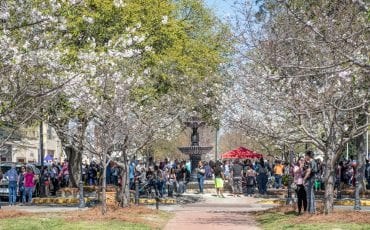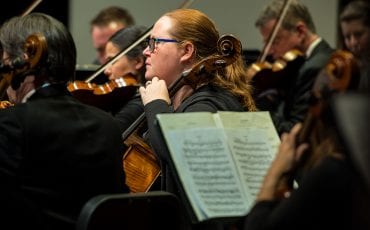Research Brings Progress in Childhood Cancer Treatments

Dr. Dan Wechsler with patient Wade Wolfe.
A diagnosis of cancer is news that no parent wants to hear, but the outlook is more hopeful today than it was 20 years ago. Great strides have been made in pediatric cancer treatment; however, there is more work to be done in the areas of funding and research.
There are 15,000 pediatric cancer cases diagnosed every year in the U.S.; about 80% of those children will survive. Those are good numbers, but still heartbreaking for the remaining 20%.
Metro Atlanta – and indeed the Southeast – is fortunate to have one of the country’s leading pediatric cancer centers in Atlanta: The Aflac Cancer and Blood Disorders Center of Children’s Healthcare of Atlanta. The center treats all forms of childhood cancers and blood disorders, whether common or rare.
“There are 15 to 20 different cancer entities that children commonly get,” says Dr. Dan Wechsler, director of pediatric oncology at the Aflac Cancer and Blood Disorders Center of Children’s Healthcare of Atlanta. “Kids get leukemia, brain tumors, kidney and bone tumors, among others. Some cancer survival rates are better than others. The cure rate for Acute Lymophoblastic Leukemia is over 90% for certain brain tumors it’s less than 10 to 20%. A kidney or muscle tumor that has spread gives a cure rate of about 15 to 20%, and not much has changed in the last 30 to 40 years.”
Wechsler points out that even after a child is cured, the problems may not go away. “We have a long way to go. Even when the cancer is cured we have to make sure it doesn’t come back. But we also have to focus on the impact that the treatment had on their lives. Some of the treatments may have long-term side effects, such as infertility, growth disturbances or second cancers.”
Table of Contents
Funding is Key
The key to finding cures is research; however, less than 4% of government funding for cancer research goes to pediatric cancers. Unfortunately, it’s a matter of numbers.
“In the past 30 years, only four drugs have been developed specifically for children fighting cancer, while hundreds have been created for adult cancers,” says Mark Myers, director of communications for CURE Childhood Cancer. “The newly enacted RACE for Children Act encourages pediatric drug development and also gives children greater access to drugs known to be effective for adults.”
Because funding is scarce, the best and brightest scientific minds typically don’t go into childhood cancer research. “We are funding young investigators who may not have enough publications to warrant money to support the research,” Myers says.
Atlanta-based CURE has two missions: fund targeted research and support patients and their families. To that end, CURE invests more than $4.3 million annually in promising research.
Sharing Research
“It’s important to pool talents, research and information,” says Wechsler. For example, the Children’s Oncology Group made up of 240 institutions around the country and world are taking the same approach to pediatric cancer. “If you’re the parent of a child diagnosed in St. Louis, you will be offered the same treatments and clinical trials as a child anywhere in the country. In the adult cancer world, that’s not the case,” he says. “The benefit is that parents don’t have to ‘shop’ for medical treatment. They will get the same treatment anywhere, and advances have been made because people cooperate really well. Everyone puts their egos aside and does what’s best for the kids. We all know early on what’s working or not, and we share it.”
Breakthroughs
Funding from CURE has led to breakthroughs in treatment. The latest advance is in precision medicine; CURE has contributed more than $6 million to the Aflac Cancer and Blood Disorders Center at Children’s and to the Target Pediatric AML project.
Precision medicine involves initially treating all patients with the standard protocol proven effective for their cancer, but if there is no positive response, the patient undergoes genetic testing on the cancerous tumor. That way, doctors can pinpoint the mutated cells and devise a customized plan to kill the cells.
“This research is for kids who have run out of options. At that point, they have their gene sequences done and they may find options,” says Myers. “Children are alive today because of the precision medicine research at Children’s. Our research is helping the 20% of kids who aren’t surviving.”
At Children’s, doctors and researchers are trying to understand the individual tumors, what makes them appear and how are they vulnerable. “Really understanding how tumors develop in the first place is critical,” Wechsler says.
Genetic testing helps researchers discover whether the tumor was hereditary, if certain treatments can cause it to reoccur more often, and if siblings inherited the gene. “We know that roughly 10% of pediatric cancers have a genetic basis,” Wechsler says. “We are identifying more and more gene mutations that can put children at a higher risk of developing cancer. The trick is to be able to know with confidence which children are more likely to get cancer – but we’re not there yet.”
Myers admits that it is often difficult to show the impact of investing in research. “It could take years before you make headway with any type of research, and ‘no’ is a possible answer. It means you don’t go down that path, but no one wants to spend money to get a ‘no.’ But sometimes you get a ‘yes’ – Lauren’s Run funded T-Cell therapy and now it’s a frontline treatment.”
In addition to funding research, CURE supports children and families – emotionally, financially and during bereavement. “It’s a devastating time. Half of our mission is to take care of families in every way we can,” says Myers.
Children’s and CURE are working together to fund research and save lives. The mission shouldn’t be measured in dollars, Wechsler says. “It’s important to recognize that the 5-year-old you’re treating today could be a future president. We’re trying to give them back their most productive years. Through research, we are continuing to work on finding cures – and there are some exciting new things coming.”
CURE Childhood Cancer: Providing Support in a Time of Need
For parents, a child’s diagnosis of cancer can leave them feeling confused and alone. In the midst of uncertainty and stress, they need support they can lean on, and that’s where CURE comes in. CURE exists to walk beside patients and families, offering unwavering help throughout their difficult journey. Until there is a cure, there’s CURE.
The second part of this Atlanta-based organization’s mission is to support families devastated by a childhood cancer diagnosis through programs designed to meet their emotional, practical and financial needs quickly and appropriately. CURE serves meals in hospitals several days a week, provides emergency financial support to ease the burden of families, and offers professional counseling to patients and family members. CURE also offers bereavement support for families who must deal with unimaginable loss.
There are many more ways CURE serves cancer patients and their families. Its goal – to be an ever-present help to families in crisis – encompasses dozens of services designed to lighten the load of families and make sure they know they aren’t alone. While COVID-19 has temporarily changed some of its protocols, CURE remains dedicated to supporting families in every way possible.
CURE was founded in 1975 by a pediatric oncologist at Emory University. At that time, few children diagnosed with cancer survived. Research has come a long way since then; today, more than 80% of children diagnosed will live. That’s good progress, but with a 1-in-5 survival rate, it’s not enough. Additionally, many children who do survive will experience significant health complications due to the side effects of cancer treatments.
Research is the key to unlocking breakthroughs that will save the lives of children diagnosed with cancer, and funding research is a vital part of CURE’s mission. In the past 10 years, CURE has invested $27 million in innovative research at Children’s Healthcare of Atlanta and many other leading pediatric cancer research institutions. Their hope is that the research they fund leads to a safe and effective treatment for all children fighting cancer.
For more information on CURE Childhood Cancer’s support services, or to see how you can get involved during September, visit curechildhoodcancer.org.
More Local Support and Resources
Parents of a child diagnosed with cancer may not know where to turn. Here are some local resources that offer much-needed support to patients and their families.
- Camp Sunshine: Programs and resources for parents and families, as well as a summer camp for children with cancer. 404-325-7979. mycampsunshine.com
- Lighthouse Family Retreat: Restorative retreats for families of children with cancer and resources such as podcasts, articles and handbooks. 678-290-2955. lighthousefamilyretreat.org
- Aurora Day Camp: Seven-week summer day camps and year-round activities for children with cancer. 470-632-0909. auroradaycamp.org
- Pediatric Brain Tumor Foundation Southeast Region: The PBTF’s Southeast Region offers social, emotional and financial support for families of children with brain tumors. 404-252-4107. curethekids.org/get-involved/chapters/georgia/
- Leukemia & Lymphoma Society of Georgia and South Carolina: LLS provides a wealth of information and resources on blood cancers as well as support for parents, siblings and caregivers. 800-955-4572. lls.org/ga-sc
- Atlanta Ronald McDonald House: Housing, meals and other resources for families whose child is receiving medical care in Atlanta. 404-315-133. armhc.org
- Aflac Inc.: The insurance provider offers ongoing support to Children’s and families with events, such as Braves Night, and My Special Aflac Duck, a toy and app designed to provide comfort and distract children from the burdens of cancer treatment. 800-992-3522. aflac.com
-Mary Welch







